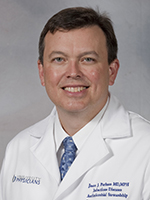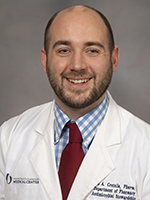Stewardship leads to shorter treatment, longer effectiveness
At the University of Mississippi Medical Center, it’s always a good time to talk about antimicrobial stewardship.

If you’re dealing with an infection, that means “getting the right diagnosis, the right drug, the right dose, the right route and the right duration,” said Dr. Jason Parham, director of the Division of Infectious Diseases at UMMC
The American College of Physicians also decided it was a good time to talk about antibacterial use. They released new guidance April 6 recommending shorter antibiotic treatment courses for:
- Uncomplicated bronchitis made worse by chronic obstructive pulmonary disease
- Community-acquired pneumonia
- Urinary tract infections
- Cellulitis
Parham said the guidance is useful for primary care providers and is a helpful reminder on the state of the science.
“This information has been around for a long time,” Parham said, noting that ACP’s systematic review includes publications more than 10 years old. “However, we see that some of these prescribing practices haven’t taken hold or have been happening slower than they need to be.”
Parham said there are multiple reasons this might be the case, whether physician unfamiliarity with best practices or thinking their patients may have exceptional circumstances. However, “the preponderance of evidence shows that for routine infections, a shorter course of antibiotics is equivalent or even superior to a longer course in terms of effectiveness.”
He said taking antibiotics for shorter periods of time also shortens the duration of unpleasant side effects.
“When taking a course of amoxicillin, you may experience adverse effects, such as abdominal cramps, diarrhea, nausea and vomiting. This can make taking an antibiotic for a sustained period of time intolerable, and that creates a risk for non-compliance with the treatment.”
There’s also evidence that the longer a patient takes an antibiotic, the more risk there is of an overgrowth of certain harmful bacteria, like Clostridium difficile.

The United States has some of the highest rates of antibiotic prescription in the developed world, and Mississippi has one of the highest rates within the country. Increased use creates more chances for bacteria to develop resistance, said Dr. David Cretella, a clinical pharmacy specialist at UMMC.
“When you expose bacteria to an antibiotic, you create pressure for those bacteria to select for the traits that make them resistant to that antibiotic,” Cretella said.
In other words, the bacteria that an antibiotic doesn’t kill can reproduce and pass on any genes that make their offspring more likely to survive the drug regimen, if they encounter it.
“Antibiotics are the only medications that, by prescribing to person A, it may not work as well for person B,” Parham said. “You can write one hundred prescriptions for an anti-hypertensive drug and not change the effectiveness of that drug for later recipients.”
When bacteria develop resistance to several drugs, that limits treatment options and leaves patients at risk. Unfortunately, it’s happening more often than physicians and pharmacists would like.
“I don’t think there is an infectious diseases doctor today who hasn’t seen a patient with a multidrug-resistant infection,” Cretella said. “And there are some drug classes that we can no longer use for certain types of infections.”
To combat this, UMMC’s Antimicrobial Stewardship Program gives evidence-based guidance to physicians for inpatient and outpatient prescribing practices, whether that be which drug to use, what route to administer it or how long to use it.
“The initial durations recommended for antimicrobials – seven days, 10 days, 14 days – were not evidence-based,” said Dr. Mary Joyce Wingler, a UMMC clinical pharmacy specialist. “We started using long-duration protocols without studies telling us why.
“Now, we know that we can use antibiotics for shorter periods of time.”
The new ACP guidelines recommend about five days of antibiotic treatment for the covered conditions, depending on the drug used.
Wingler said the Centers for Disease Control and Prevention has lots of information online about the importance of antimicrobial stewardship. UMMC’s team is using that guidance to develop educational materials and to guide clinical decision-making.
“For example, with asymptomatic cases of infection, the risks associated with prescribing an antibiotic are usually greater than the benefits,” she said.
At outpatient visits, UMMC’s experts recommend patients and physicians discuss how antibiotics work, their benefits and costs, and how physicians determine if the drug might help the patient before writing and filling a prescription.
Parham urges people who do get a prescription not to use leftover medicine for other infections.
“Antibiotics are not one-size-fits-all,” Parham said. “What we’d prescribe for your grandmother may not be the right medication or the right dose for your child, and what we may prescribe for strep throat may not be appropriate for pneumonia.”
Wingler and Cretella also encourage patients to tell their doctor or pharmacist about any other medicines they are taking before starting antibiotic treatment. The pharmacist can check for potential interactions that could make the medications less effective, and the doctor can watch for changes in laboratory values or other aspects of the patient’s health.
“Antibiotics are a modern marvel,” Cretella said. However, “If we misuse them today, we can’t use them later.
“There is potentially a world where we may not have effective antibiotics, but if we use them judiciously, thoughtfully and intelligently, we can preserve them for the future.”
The above article appears in CONSULT, UMMC’s monthly e-newsletter sharing news about cutting-edge clinical and health science education advances and innovative biomedical research at the Medical Center and giving you tips and suggestions on how you and the people you love can live a healthier life. Click here and enter your email address to receive CONSULT free of charge. You may cancel at any time.



